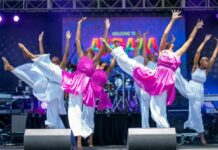Until last year, Thomas Dolby had never spent much time in Baltimore. But when his “Invisible Lighthouse” tour brought him through Charm City, he decided to have dinner at a restaurant by the harbor, followed by a sunset stroll down the cobblestone streets of Fells Point.
“I was really enamored with it,” he says. “It just seemed like a city that has a lot of possibilities.”
Starting this fall, Dolby could help the city realize some of those possibilities. The man best known for the 1980s synth pop hits “She Blinded Me With Science” and “Hyperactive” is becoming the first Homewood Professor of the Arts at Johns Hopkins University, where he will teach “Sound on Film,” a course that helps students from Hopkins and Peabody craft soundtracks for movies.
 The new position also brings Dolby into the heart of Baltimore’s surging arts and music scene. He’s helping to launch a new film and technology center at two sites in the Station North Arts and Entertainment District: the old Parkway Theatre and the building at 10 E. North Ave.—both of which are under renovation. It’s a joint effort among Hopkins, the Maryland Film Festival and MICA, which could be a big step for the neighborhood’s ongoing revitalization.
The new position also brings Dolby into the heart of Baltimore’s surging arts and music scene. He’s helping to launch a new film and technology center at two sites in the Station North Arts and Entertainment District: the old Parkway Theatre and the building at 10 E. North Ave.—both of which are under renovation. It’s a joint effort among Hopkins, the Maryland Film Festival and MICA, which could be a big step for the neighborhood’s ongoing revitalization.
“Back in the 1920s and 1930s, Station North was really hopping,” Dolby says. “It would be fantastic if it could come back.”
If you’re only familiar with Dolby’s hits from decades ago, this new position might seem like something of a comeback for the mad scientist of music. While Dolby did take a 14-year hiatus from the spotlight, he stayed at the cutting edge of technology, music and film—just behind the scenes.
Born Thomas Morgan Robertson, he grew so interested in keyboards and recording equipment that his friends nicknamed him Dolby, after the audio company Dolby Laboratories. He was fond of silent movies, especially the way their stars (Buster Keaton, Charlie Chaplin) played the underdog. Later, when Dolby began performing in the late ’70s and early ’80s, he would borrow their vintage trench coats, suits and hats, throw in a bit of what he calls the “academic look” and use it in his music videos.
“It was the age of pin-up boy frontmen in bands—people like Sting, Adam Ant and so on,” Dolby says. “I didn’t feel like I could really compete in the handsome boy stakes. So I thought, ‘The thing to do is set myself apart.’”
Which he did—so well, in fact, that people still come up to him on the street and shout “Science!” or whistle a few lines of “Hyperactive.”
For a time, Dolby popped up all over the music industry. To help pay for the studio time to record his first album, he played synthesizers on the Foreigner hits “Urgent” and “Waiting for a Girl Like You.” Def Leppard brought him in to record parts for their “Pyromania” album, and Pink Floyd’s Roger Waters cast Dolby in the 1990 concert of “The Wall.”
In 1992, after releasing four albums in 10 years, Dolby left show business and moved to Silicon Valley, where he developed technology for cellphone ringtones. He became musical director of the TED (Technology, Entertainment, Design) Conference, where luminaries from all different fields came to share ideas. By the time Dolby dipped his toe back into the music scene in 2006, it was a different world.
“I felt a bit like Austin Powers, waking up after decades of cryogenic freezing and there were all these shiny new toys to play with,” he says.
For the past several years, Dolby, 55, has lived in Suffolk, along the east coast of England, with his wife, Kathleen Beller (who played Kirby Colby on “Dynasty”). They also have three college-age kids. In England, Dolby loves to sail and watch shipping boats drift along the distance. He even filmed a documentary about a decommissioned lighthouse by his home, which he took on tour with live music.
Titled “The Invisible Lighthouse,” it won Best Picture at last year’s DIY Film Festival. He’s a “water-oriented person,” so it’s no surprise he and Beller are moving into a new Baltimore home right by the harbor.
But that’s not all Dolby likes about Charm City. He turned down a job offer in Boston to take the position at Hopkins in part because, he says, “Baltimore just seemed to have a freshness to it.”
Once the Parkway is up and running, Dolby plans to host a show similar to a TED talk, where guests from the music industry would come to talk shop with an audience. It would be broadcast live, and focus on composition, production and sound design.
“There’s clearly an appetite for audiences to understand what goes on behind the scenes,” Dolby says. “A few decades ago, if you were a celebrity, you were encouraged to be in a fishbowl, to keep a distance from your audience. Now with blogging, with tweeting, I think we’re in an age where performers are willing to let their guard down and share their process.”
As a child, Dolby was surrounded by teachers. His father, grandfather and great-grandfather were professors at the University of Cambridge. His mother taught algebra. And though all five of his siblings would go on to become teachers, Dolby at first chose a different path, skipping college for a career in music.
“I was the youngest of six kids, so there was never any parental pressure on me to follow in their academic footsteps,” Dolby said. “But it wouldn’t have surprised me if they secretly thought, ‘After a few years of banging his head against a brick wall in showbiz, he might come back to the fold and end up in academia.”
Though it took a few decades (and perhaps a bit of head-banging), he has at last become Professor Dolby—though he’s still getting used to the title.
“Annoyingly, most pull-down menus on the Internet only have ‘Mr.,’ ‘Mrs.’, and ‘Ms.’ They might have ‘Dr.,’ but very few of them have ‘Prof,’” Dolby says. “I have to do something about that. Otherwise, how am I going to get a good table at a restaurant?”




